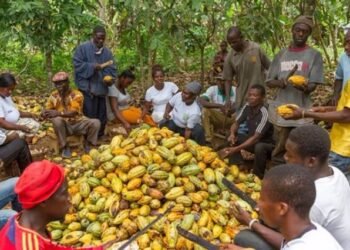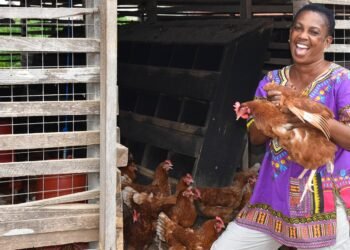A new research conducted by Balikisu Osman, a PhD Candidate in Environmental Studies at the York University, Canada, has revealed significant variations in food availability and access throughout the year in the northern part of Ghana.
Food is highly available in most households during the four-month harvesting season from August/September to November/December. Beyond this period, the quantity of households’ food stock starts to deplete and subsequently becomes rare or unavailable between the months of May and August – the period often referred to as the hungry season.
These findings, according to Mr. Balikisu, resonate with reports of reduced food availability and extended months of hunger in rural farming communities across northern Ghana and other deprived areas of Africa and the world.
“I also found that growing food is not the only way smallholder farmers obtain food to feed their families; they also buy from the market. The smallholder farmers’ reliance on market purchases increases progressively after the four-month harvesting season. Most households purchase food from the market during the hungry season, especially in June and July.”
Balikisu Osman
The increasing importance of market purchases in the months after immediate post-harvest is attributable to several factors, including the lack of proper storage to keep food crops longer after harvesting.
Problem of storage and markets
The research also showed that limited access to proper storage facilities and markets contribute to smallholder farmers’ inability to feed their families throughout the year.

Most farmers (76.6%) store their crops in reserved spaces in their bedrooms or homes. Some (47.2%) reported storing crops in mud-constructed barns/silos.
These storage options enable farmers to keep crops for a few months after harvest, allowing marketing flexibility and food availability during out-of-season periods. However, the stores are mostly built of mud and plant materials, usually dilapidated and unable to maintain air tightness to eliminate insect pest attacks at storage.
Although there are two grain-storage warehouses in the study district, the total capacity is only 1120MT and, therefore, cannot serve all the farmers. Besides, the two warehouses are located in the Navrongo area, far out of reach for most farmers to store their crops.
Earlier research in the study area had shown that storage challenges resulted in about 35% losses in grain crops, equivalent to weeks’ worth of consumption. The lack of proper storage also compels farmers to hasten crop sales after harvest, contributing to the diminishing food availability and households’ vulnerability to food insecurity in the hungry seasons.
Even more interesting, the research found that the problem of hunger is further exacerbated by poor transportation and access to the market. There is one central market in Navrongo, the district capital, and seven satellite markets serving various scattered communities. Compared to the main market, the satellite markets act as a converging point for a small number of buyers and sellers offering a few bowls of grains.
Lack of access to transportation
Although most households must rely on the market to buy food in the hungry season, they do not have direct access to vehicular transportation to travel to the Navrongo market. As a result, households are constrained to buy food crops from the satellite markets where prices are higher as very few farmers have food crops to sell in the lean season.
It is important to note that the lack of proper storage facilities and functional markets intensifies the difficulties of smallholder households in maintaining food security throughout the year, Mr. Balikisu argued.
Mr. Balikisu called for increased investment in food storage and processing facilities, market access, rural transportation, and buffer stock at regional and district levels to protect smallholder households against variations in food availability and access.
Ghana is one of the few countries often praised for achieving impressive reductions in hunger. The 2022 Global Hunger Index report reveals Ghana’s hunger score has declined by more than 50 percent since the year 2000.
However, the World Food Programme’s 2020 comprehensive food security and vulnerability analysis, showed that an estimated 11.7% of Ghanaians are food insecure. The northern part of Ghana has the highest prevalence of food insecurity, at 23-49%, compared to 4-10% in the southernmost regions.
READ ALSO: Lands Minister Commissions Centre To Track Explosive Vehicles And Excavators























